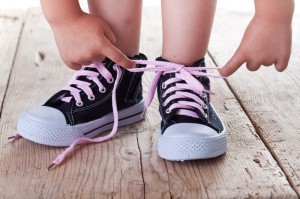Making New Behaviors Stick
My last post argued that knowing about cognitive biases and how our brain works is valuable, even if knowing isn’t enough to effectively change our behavior. Tweeter Jessica Kerr sums this up nicely, “Knowing isn't half the battle, but without it, we don't know the battle exists.” Knowing doesn’t prevent automatic behaviors and biased reactions. However, knowing gives us words we can use to reflect on our actions and feelings.
And then what? After awareness comes the really hard parts: consciously replacing undesirable, semi-automatic behaviors with more desirable ones.
Much of our daily behavior is driven by habit. Social psychologists estimate around 35-50% of our daily behaviors are driven by habit. Personally, I think that may be somewhat on the low end.
There’s a good reason for habits. If we had to consciously think through every action we took, we’d be exhausted. When we have to consciously think about how to perform any task, it takes mental energy. And that wears us out. When we are tired we unconsciously fall back on our fast (associative) thinking to conserve mental energy and provide easy (if not always well-reasoned) answers to difficult questions.

It’s better if we can slip on our shoes in the morning and tie them without thinking.
We actively use our system 2 brain when we learn new skills or are placed into unfamiliar situations (think trying to navigate around a new neighborhood, learning customs in an unfamiliar country, learning a new problem domain or new programming language, or tracking down a tricky intermittent software bug).
When we’re not forced to work so hard, we mentally take it easy. We’re NOT lazy. But we do many things out of habit, to conserve our slow thinking, system 2 brain for when we really need it.
But what if we want to replace an old habit with a new improved one—and make that new habit automatic?
To change entrenched habits, we have to find effective replacements, insert them into our daily life...and be vigilant. This takes energy and effort.
The bad news: Old habits can still be triggered. They don’t disappear. They are simply supplanted by more recent habits (if those new habits can be successfully triggered).
One way to thwart undesirable habits is to remove their triggers from your environment. That’s why some people recommend removing unhealthy food from your household and environment when wanting to develop healthier eating habits (easier said than done when you live with others or if there are always donuts at work on Fridays).
When it’s impractical to remove undesirable triggers, you’ve simply got to deal with them. Instead of reacting blindly to that old trigger, you can experiment with introducing new behaviors for that trigger with even stronger rewards. When the donuts show up at work, treat yourself to a good cup of coffee and slightly healthier biscotti instead (if you really really like donuts this isn’t going to work). Better yet, avoid the strongest morning donut trigger by coming later on Friday after all the good donuts are gone (those stale donuts may be a trigger that you are still suceptible to, especially if you are tired).
This isn’t easy. Change rarely is.
Perhaps another solution to making changes stick is diligence. Be on the lookout for undesired behaviors/actions/triggers. Spot them, then quickly squelch 'em. Then go back to doing the desired behavior. This works, for a while.
Exercising diligence takes mental energy. You only have limited amounts of willpower to spare and when it is gone, well, things can get ugly. That’s why after a stressful day (when your system 2 is already tired from everything else you used it for) that you can let down your guard in a heartbeat. And then, dammit!…you slip up. You notice you slip up, beat yourself up about it, and vow to be even more vigilant. But you slip up again and…rinse, repeat…. I am not going to continue down this rat hole because it IS depressing.
So how do we get ourselves out of these mental ruts?
Evidence suggests that too much retrospection isn’t good. So don’t beat yourself up when you slip up. Recognize that you’ve slipped up and try again. Switch things up and keep on trying (identify a better trigger or reward, experiment, try and try again). Don't give up or give in to a defeatist attitude.
Some good news: Research suggests we are more successful at changing behaviors when we go through life changing events—when we move, retire, graduate from school, go off to college, start a new job, quit a job, marry, get ill—we are more open to change.
But I don’t wait for a big event to effect big changes. I don’t make New Year’s resolutions, either. Instead, I periodically mix things up and try new things just for their novelty. Life is a grand experiment.
But still…research hasn’t yet shown how to sustain new behaviors. Even years after embracing new behaviors, we are prone to slipping up, given the right triggers (think vacations, travel, holidays).
Knowing how we can slip-up is not enough to avoid slip-ups. Santos and Gendler are right.
But believing that you can recover after a slip up is key to getting back on track. And that’s where a positive mindset, determination, the belief that you can learn from mistakes, and resilience go a long way towards making change and making changes stick.
Footnote: The Power of Habit by Charles Duhigg is a good book for those wanting to know more about habits in their life and business.